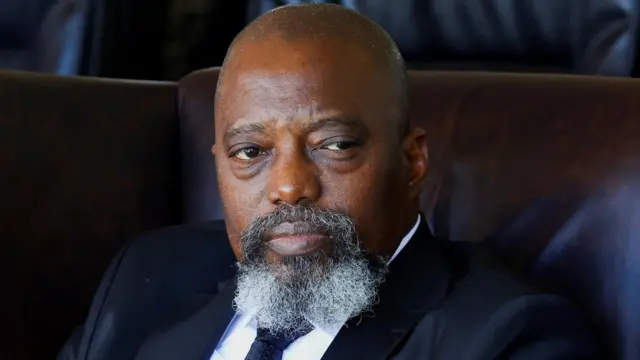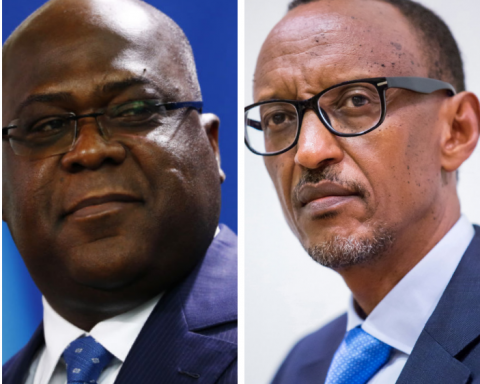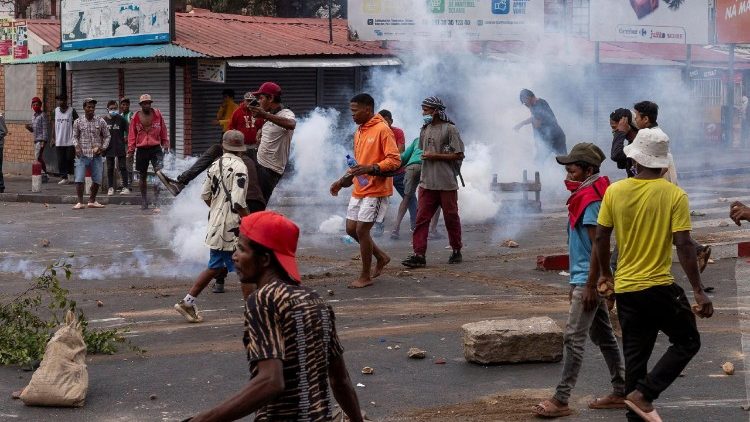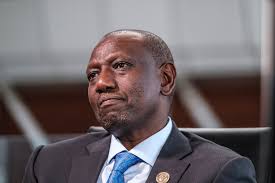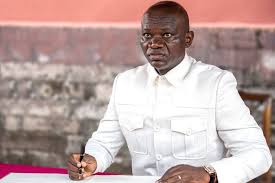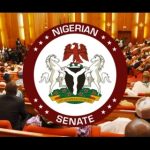Former President of the Democratic Republic of Congo, Joseph Kabila was sentenced to death in absentia by a military court in Kinshasa on Tuesday after being found guilty of war crimes, treason, and crimes against humanity linked to his alleged support for the M23 rebel group in eastern Congo.
Lieutenant-General Joseph Mutombo Katalayi, presiding over the tribunal, said Kabila was convicted of murder, sexual assault, torture, and insurrection. “In applying Article 7 of the Military Penal Code, it imposes a single sentence, namely the most severe one, which is the death penalty,” Katalayi said as he delivered the verdict. Kabila did not attend the trial and was not represented by legal counsel.
Join our WhatsApp ChannelIn addition to the death sentence, the court ordered Kabila to pay roughly US$50 billion in damages to the state and to victims of the conflict. The charges stem from accusations that he supported the M23 insurgency, a Rwanda-linked rebel movement that has seized territory in eastern Congo, including key cities such as Goma and Bukavu, contributing to ongoing instability in the region.
Kabila, who led the Democratic Republic of Congo from 2001 to 2019, has denied any wrongdoing and said the judiciary is politicized. His political party, the People’s Party for Reconstruction and Democracy (PPRD), condemned the verdict as politically motivated, calling it an attempt to neutralize a key opposition figure.
Kabila’s current whereabouts are unknown, though he has spent much of his time since 2023 outside the country, primarily in South Africa. Analysts warn that the unprecedented ruling, the first time a former Congolese head of state has been sentenced to death by a domestic court for alleged treason and
war crimes, could further inflame political tensions or trigger unrest.
The case highlights the deep challenges facing the DRC, where decades of conflict, rebel activity, and governance crises have left the eastern provinces particularly volatile. The verdict is likely to have significant political and security implications for the nation in the coming months.
- Prime Business Africa
- Prime Business Africa
- Prime Business Africa
- Prime Business Africa
- Prime Business Africa
- Prime Business Africa
- Prime Business Africa
- Prime Business Africa
- Prime Business Africa
- Prime Business Africa
- Prime Business Africa
- Prime Business Africa
- Prime Business Africa
- Prime Business Africa
- Prime Business Africa
- Prime Business Africa
- Prime Business Africa
- Prime Business Africa
- Prime Business Africa
- Prime Business Africa
- Prime Business Africa
- Prime Business Africa
- Prime Business Africa
- Prime Business Africa
- Prime Business Africa
- Prime Business Africa
- Prime Business Africa
- Prime Business Africa
- Prime Business Africa
- Prime Business Africa
- Prime Business Africa
- Prime Business Africa
- Prime Business Africa
- Prime Business Africa
- Prime Business Africa
- Prime Business Africa
- Prime Business Africa
- Prime Business Africa
- Prime Business Africa
- Prime Business Africa
- Prime Business Africa
- Prime Business Africa
- Prime Business Africa
- Prime Business Africa
- Prime Business Africa
- Prime Business Africa
- Prime Business Africa
- Prime Business Africa
- Prime Business Africa
- Prime Business Africa
- Prime Business Africa
- Prime Business Africa
- Prime Business Africa
- Prime Business Africa
- Prime Business Africa
- Prime Business Africa
- Prime Business Africa
- Prime Business Africa
- Prime Business Africa
- Prime Business Africa
- Prime Business Africa
- Prime Business Africa
- Prime Business Africa
- Prime Business Africa
- Prime Business Africa
- Prime Business Africa
- Prime Business Africa
- Prime Business Africa
- Prime Business Africa
- Prime Business Africa
- Prime Business Africa
- Prime Business Africa
- Prime Business Africa
- Prime Business Africa
- Prime Business Africa
- Prime Business Africa
- Prime Business Africa
- Prime Business Africa
- Prime Business Africa
- Prime Business Africa
- Prime Business Africa
- Prime Business Africa
- Prime Business Africa
- Prime Business Africa
- Prime Business Africa
- Prime Business Africa
- Prime Business Africa
- Prime Business Africa
- Prime Business Africa
- Prime Business Africa
- Prime Business Africa
- Prime Business Africa
- Prime Business Africa
- Prime Business Africa
- Prime Business Africa
- Prime Business Africa
- Prime Business Africa
- Prime Business Africa
- Prime Business Africa
- Prime Business Africa
- Prime Business Africa
- Prime Business Africa
- Prime Business Africa
- Prime Business Africa
- Prime Business Africa
- Prime Business Africa
- Prime Business Africa
- Prime Business Africa
- Prime Business Africa
- Prime Business Africa
- Prime Business Africa
- Prime Business Africa
- Prime Business Africa
- Prime Business Africa
- Prime Business Africa
- Prime Business Africa
- Prime Business Africa
- Prime Business Africa
- Prime Business Africa
- Prime Business Africa
- Prime Business Africa
- Prime Business Africa
- Prime Business Africa
- Prime Business Africa
- Prime Business Africa
- Prime Business Africa
- Prime Business Africa
- Prime Business Africa
- Prime Business Africa
- Prime Business Africa
- Prime Business Africa
- Prime Business Africa
- Prime Business Africa
- Prime Business Africa
- Prime Business Africa
- Prime Business Africa
- Prime Business Africa
- Prime Business Africa
- Prime Business Africa
- Prime Business Africa
- Prime Business Africa
- Prime Business Africa
- Prime Business Africa
- Prime Business Africa
- Prime Business Africa
- Prime Business Africa
- Prime Business Africa
- Prime Business Africa
- Prime Business Africa
- Prime Business Africa
- Prime Business Africa
- Prime Business Africa
- Prime Business Africa
- Prime Business Africa
- Prime Business Africa
- Prime Business Africa
- Prime Business Africa
- Prime Business Africa
- Prime Business Africa
- Prime Business Africa
- Prime Business Africa
- Prime Business Africa
- Prime Business Africa
- Prime Business Africa
- Prime Business Africa
- Prime Business Africa
- Prime Business Africa
- Prime Business Africa
- Prime Business Africa
- Prime Business Africa
- Prime Business Africa
- Prime Business Africa
- Prime Business Africa
- Prime Business Africa
- Prime Business Africa
- Prime Business Africa
- Prime Business Africa
- Prime Business Africa
- Prime Business Africa
- Prime Business Africa
- Prime Business Africa
- Prime Business Africa
- Prime Business Africa
- Prime Business Africa
- Prime Business Africa
- Prime Business Africa
- Prime Business Africa
- Prime Business Africa
- Prime Business Africa
- Prime Business Africa
- Prime Business Africa
- Prime Business Africa
- Prime Business Africa
- Prime Business Africa
- Prime Business Africa
- Prime Business Africa
- Prime Business Africa
- Prime Business Africa
- Prime Business Africa
- Prime Business Africa
- Prime Business Africa
- Prime Business Africa
- Prime Business Africa
- Prime Business Africa
- Prime Business Africa
- Prime Business Africa
- Prime Business Africa
- Prime Business Africa
- Prime Business Africa
- Prime Business Africa
- Prime Business Africa
- Prime Business Africa
- Prime Business Africa
- Prime Business Africa
- Prime Business Africa
- Prime Business Africa
- Prime Business Africa
- Prime Business Africa
- Prime Business Africa
- Prime Business Africa
- Prime Business Africa
- Prime Business Africa
- Prime Business Africa
- Prime Business Africa
- Prime Business Africa
- Prime Business Africa
- Prime Business Africa
- Prime Business Africa
- Prime Business Africa
- Prime Business Africa
- Prime Business Africa
- Prime Business Africa
- Prime Business Africa
- Prime Business Africa
- Prime Business Africa
- Prime Business Africa
- Prime Business Africa
- Prime Business Africa
- Prime Business Africa
- Prime Business Africa
- Prime Business Africa
- Prime Business Africa
- Prime Business Africa
- Prime Business Africa
- Prime Business Africa
- Prime Business Africa
- Prime Business Africa
- Prime Business Africa
- Prime Business Africa
- Prime Business Africa
- Prime Business Africa
- Prime Business Africa
- Prime Business Africa
- Prime Business Africa
- Prime Business Africa
- Prime Business Africa
- Prime Business Africa
- Prime Business Africa
- Prime Business Africa
- Prime Business Africa
- Prime Business Africa
- Prime Business Africa
- Prime Business Africa
- Prime Business Africa
- Prime Business Africa
- Prime Business Africa
- Prime Business Africa
- Prime Business Africa
- Prime Business Africa
- Prime Business Africa
- Prime Business Africa
- Prime Business Africa
- Prime Business Africa
- Prime Business Africa
- Prime Business Africa
- Prime Business Africa
- Prime Business Africa
- Prime Business Africa
- Prime Business Africa
- Prime Business Africa
- Prime Business Africa
- Prime Business Africa
- Prime Business Africa
- Prime Business Africa
- Prime Business Africa
- Prime Business Africa
- Prime Business Africa
- Prime Business Africa
- Prime Business Africa
- Prime Business Africa
- Prime Business Africa
- Prime Business Africa
- Prime Business Africa
- Prime Business Africa
- Prime Business Africa
- Prime Business Africa
- Prime Business Africa
- Prime Business Africa
- Prime Business Africa
- Prime Business Africa
- Prime Business Africa
- Prime Business Africa
- Prime Business Africa
- Prime Business Africa
- Prime Business Africa
- Prime Business Africa
- Prime Business Africa
- Prime Business Africa
- Prime Business Africa
- Prime Business Africa
- Prime Business Africa
- Prime Business Africa
- Prime Business Africa
- Prime Business Africa
- Prime Business Africa
- Prime Business Africa
- Prime Business Africa
- Prime Business Africa
- Prime Business Africa
- Prime Business Africa
- Prime Business Africa
- Prime Business Africa
- Prime Business Africa
- Prime Business Africa
- Prime Business Africa
- Prime Business Africa
- Prime Business Africa
- Prime Business Africa
- Prime Business Africa
- Prime Business Africa
- Prime Business Africa
- Prime Business Africa
- Prime Business Africa
- Prime Business Africa
- Prime Business Africa
- Prime Business Africa
- Prime Business Africa
- Prime Business Africa
- Prime Business Africa
- Prime Business Africa
- Prime Business Africa
- Prime Business Africa
- Prime Business Africa
- Prime Business Africa
- Prime Business Africa
- Prime Business Africa
- Prime Business Africa
- Prime Business Africa
- Prime Business Africa
- Prime Business Africa
- Prime Business Africa
- Prime Business Africa
- Prime Business Africa
- Prime Business Africa
- Prime Business Africa
- Prime Business Africa
- Prime Business Africa
- Prime Business Africa
- Prime Business Africa
- Prime Business Africa
- Prime Business Africa
- Prime Business Africa
- Prime Business Africa
- Prime Business Africa
- Prime Business Africa
- Prime Business Africa
- Prime Business Africa
- Prime Business Africa
- Prime Business Africa
- Prime Business Africa
- Prime Business Africa
- Prime Business Africa
- Prime Business Africa
- Prime Business Africa
- Prime Business Africa
- Prime Business Africa
- Prime Business Africa
- Prime Business Africa
- Prime Business Africa
- Prime Business Africa
- Prime Business Africa
- Prime Business Africa
- Prime Business Africa
- Prime Business Africa
- Prime Business Africa
- Prime Business Africa
- Prime Business Africa
- Prime Business Africa
- Prime Business Africa
- Prime Business Africa
- Prime Business Africa
- Prime Business Africa
- Prime Business Africa
- Prime Business Africa
- Prime Business Africa
- Prime Business Africa
- Prime Business Africa
- Prime Business Africa
- Prime Business Africa
- Prime Business Africa
- Prime Business Africa
- Prime Business Africa
- Prime Business Africa
- Prime Business Africa
- Prime Business Africa
- Prime Business Africa
- Prime Business Africa
- Prime Business Africa
- Prime Business Africa
- Prime Business Africa
- Prime Business Africa
- Prime Business Africa
- Prime Business Africa
- Prime Business Africa
- Prime Business Africa
- Prime Business Africa
- Prime Business Africa
- Prime Business Africa
- Prime Business Africa
- Prime Business Africa
- Prime Business Africa
- Prime Business Africa
- Prime Business Africa
- Prime Business Africa
- Prime Business Africa
- Prime Business Africa
- Prime Business Africa
- Prime Business Africa
- Prime Business Africa
- Prime Business Africa
- Prime Business Africa
- Prime Business Africa
- Prime Business Africa
- Prime Business Africa
- Prime Business Africa
- Prime Business Africa
- Prime Business Africa
- Prime Business Africa
- Prime Business Africa
- Prime Business Africa
- Prime Business Africa


